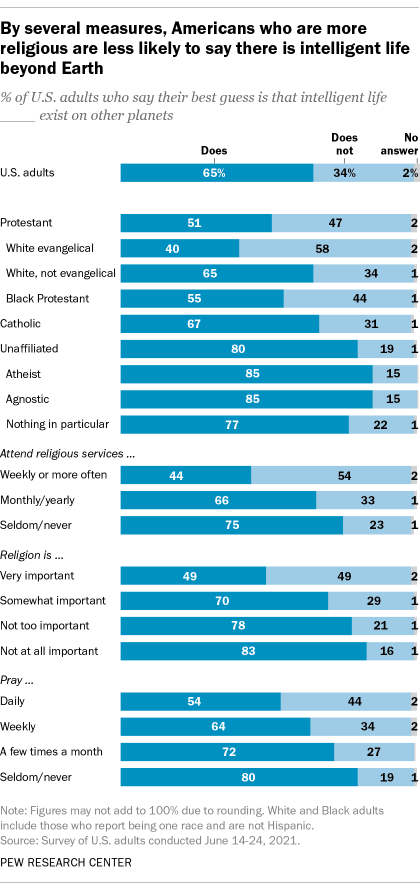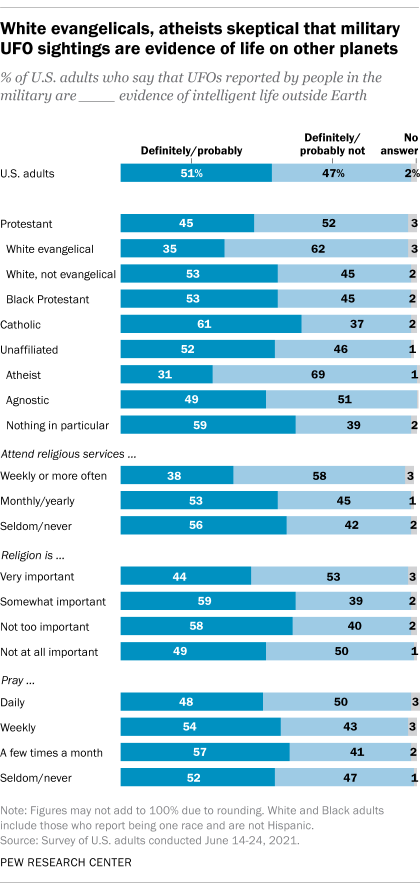Religious and secular thinkers alike have long discussed what the implications for religion would be if humans discovered intelligent life on other planets. In the United States, highly religious adults are much more skeptical about the possibility of extraterrestrial life compared with those who are less religious, according to a recent Pew Research Center survey.
These findings are from a recent Pew Research Center survey about a range of issues, including the possibility of intelligent life on other planets. We surveyed 10,417 U.S. adults between June 14 and 24, 2021. Everyone who took part is a member of the Center’s American Trends Panel (ATP), an online survey panel that is recruited through national, random sampling of residential addresses. This way nearly all U.S. adults have a chance of selection. The survey is weighted to be representative of the U.S. adult population by gender, race, ethnicity, partisan affiliation, education and other categories. Read more about the ATP’s methodology.
Here are the questions used for this report, along with responses, and its methodology.
This is evidenced by a variety of measures of religious engagement. For example, U.S. Christians are far less likely than religiously unaffiliated Americans to say that their “best guess” is that intelligent life exists on other planets (57% vs. 80%). And U.S. adults who attend religious services on at least a weekly basis are considerably less likely than those who seldom or never attend services to say that intelligent life exists elsewhere (44% vs. 75%).
Similarly, around half of Americans who say religion is very important to them (49%) say their best guess is that intelligent life exists on other planets. By comparison, roughly three-quarters of those who say that religion is less important in their lives (76%) say that intelligent life exists elsewhere. Adults who pray daily are also less likely than those who seldom or never pray to say intelligent life exists on other planets (54% vs. 80%).
White evangelical Protestants, who tend to be highly religious, are less likely than other religious groups to say intelligent life probably exists on other planets; 40% hold this view. Most White non-evangelical Protestants (65%), Catholics (67%) and religiously unaffiliated adults (80%) say their best guess is that there is intelligent life beyond Earth. Black Protestants are more divided on the topic, with 55% saying their best guess is that intelligent life exists on other planets and 44% expressing the opposite opinion. (Due to sample size limitations, this analysis does not show some smaller religious groups, including Jewish and Muslim Americans.)
The June survey also asked Americans whether they believe recent UFO sightings by people in the military are evidence of intelligent life beyond Earth. (The survey was conducted just before the U.S. military’s recent release of a report about UFO sightings.)
Americans who attend religious services weekly or more often are less inclined than others to see military UFO sightings as evidence of extraterrestrial life. This also varies by religious affiliation – though the pattern differs somewhat from the broader question about the existence of life beyond Earth. In fact, while the vast majority of self-described atheists (85%) say their best guess is that intelligent life exists on other planets, far fewer (31%) say that UFOs reported by the military are definitely or probably evidence of this. On this question, atheists are about as skeptical as White evangelical Protestants, 35% of whom see UFOs as evidence of extraterrestrial life.
By contrast, roughly half or more of agnostics (49%), Black Protestants (53%), White non-evangelical Protestants (53%), people who describe their religion as “nothing in particular” (59%) and Catholics (61%) say that UFOs reported by people in the military are definitely or probably evidence that intelligent life exists beyond Earth.
When it comes to whether UFOs are friendly or a threat to U.S. national security, opinions vary modestly along religious lines. Majorities across religious groups say they think UFOs are neither friendly nor unfriendly, and relatively few people – regardless of religion – view UFOs as a major threat to U.S. national security.

from WordPress https://ift.tt/3f5HrYF
via IFTTT




No comments:
Post a Comment